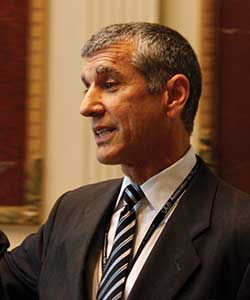John T. Cacioppo, 1951-2018
APS Past President John T. Cacioppo, a cofounder of the field of social neuroscience and a 2018 recipient of the APS William James Fellow Award, died on March 5.
Cacioppo, the Tiffany & Margaret Blake Distinguished Service Professor of Psychology and of Psychiatry and Behavioral Neuroscience at the University of Chicago, studied the connections between the social and neural mechanisms underlying human behavior. He investigated how societal influences and personal relationships affect cognition and emotions.
Cacioppo’s research focused on understanding the neural, hormonal, and genetic mechanisms that motivate humans to interact and their effects on the mind, behavior, and health. These pursuits all fall under the umbrella of the social neuroscience field that he founded in collaboration with APS Fellow Gary Berntson of Ohio State University. His most recent research focused on the adverse effects of social isolation and loneliness on our well-being.
APS named Cacioppo a recipient of the William James Fellow Award in recognition of his lifetime of significant intellectual contributions to the basic science of psychology. His other honors include the National Academy of Science’s Troland Research Award, which he received in 1989 in recognition of his outstanding scientific achievement in experimental psychology.
As APS President from 2007 to 2008, Cacioppo authored a presidential column on psychological science as a hub discipline. That column continues to be among the most influential and widely read articles on the importance of collaboration and multidisciplinary research.
In 2013, Cacioppo was among some of the world’s leading figures in psychological and economics research to gather at a White House workshop to discuss how to incorporate psychological empiricism into policymaking. APS was an organizer of the event along with the White House Office of Science and Technology Policy, the National Institute on Aging, and the White House Council of Economic Advisers. The workshop, which included presentations from Cacioppo, Nobel Laureate and APS William James Fellow Daniel Kahneman, APS Past Presidents Walter Mischel, Susan T. Fiske, and Elizabeth Phelps, and APS Fellow Robert Cialdini, influenced the Obama Administration’s creation of the Social and Behavioral Sciences Team to help the federal government translate scientific findings into solving practical policy problems.
Cacioppo founded the University of Chicago Center for Cognitive & Social Neuroscience and was the Director of the Arete Initiative of the Office of the Vice President for Research and National Laboratories at the University of Chicago. He and his colleague, APS Fellow Jean Decety, played leading roles in the founding of the Society for Social Neuroscience in 2010.
Cacioppo served on various boards, including the President’s Committee for the National Medal of Science; the Advisory Committee for the Directorate for Social, Behavioral, and Economic Sciences of the National Science Foundation; the National Institutes of Health Center for Scientific Review Advisory Council; the Expert Panel on Program to Reduce Social Isolation, Mary Foundation in Copenhagen; the Board of Directors of the Federation of Associations in Behavioral & Brain Sciences; the External Advisory Committee of the Beckman Institute for Advanced Science and Technology at the University of Illinois; and the US Department of Health and Human Services National Advisory Council on Aging.






Comments
John was a wonderful and inspiring teacher. I had the honor of being a student in a seminar he led for NIH on the social-psychology of aging. He was outstanding.
APS regularly opens certain online articles for discussion on our website. Effective February 2021, you must be a logged-in APS member to post comments. By posting a comment, you agree to our Community Guidelines and the display of your profile information, including your name and affiliation. Any opinions, findings, conclusions, or recommendations present in article comments are those of the writers and do not necessarily reflect the views of APS or the article’s author. For more information, please see our Community Guidelines.
Please login with your APS account to comment.